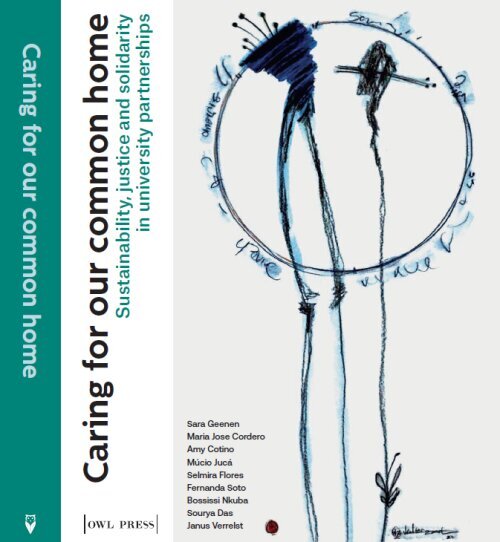
This book is the result of forty years of collaboration between the University Foundation for Development Cooperation (USOS) at the University of Antwerp and its partner institutions in the South. The book attempts to formulate a number of responses to the devastating consequences of climate change, loss of biodiversity, extractivism, social exclusion, and growing inequality by emphasizing the practices and struggles of local and indigenous communities. The book is a collection of submissions from the global partner network and draws on a variety of disciplines such as Design Sciences, Medical Sciences, Law, Biology, Economics, and Development Studies.
Published by Owl Press - Borgerhoff & Lamberigts. Click here to find the book in the publisher's shop
Practical details about the book
- Language: English
- Pages: 418
- Publication date: September 26, 2025
- EAN number: 9789493428423
- Format: 240 mm x 188 mm
- Weight: 890 grams
Chapters of the book
- The rocky, rousing road to collaboration. Reflecting on the partnership between the University of Antwerp and the Catholic University of Bukavu
- From extraction to action in Kamituga. Addressing health in artisanal and small-scale gold mining
- Designing global engagement education in design sciences Participatory Action Research and cultural brokerage in the academic collaboration between Recife and Antwerp
- Learning from climate monitoring in rural areas in Nicaragua
- Architecture opened up by academic practice
- Timber tales. Crafting identity and community in post-extractive Moengo
- Sarhul. Understanding environmental conservation through tribal festivals
- Imagining the environment. Perspectives from the Indigenous communities of Eastern India
- Identity metamorphosis of the social environment. The case of the relocation of the Roque Santeiro community to the Sérgio Loreto housing complex in Recife, Brazil
- From handmade gravel to the handmade city. The supply chain of construction materials in Bukavu, Democratic Republic of Congo
- Shining a light on the shadows. Examining working conditions in the cement industry amidst Chinese capitalism
- Land rights, conflict, and inter-institutional interplay. Empirical evidence from Dadanpatrabarh Coast of West Bengal, India 309
- The social responsibility of extractive companies in Congo Basin countries and the preservation of the planet’s environment. Analysis of legal frameworks and practices
- Safeguarding Central America’s biodiversity. Empowering effective environmental policy for our common home
- Social innovation as a tool for climate resilience. The case of LIMCS at the Catholic University of Pernambuco, Brazil
Epilogue. Looking back at 40 years of USOS